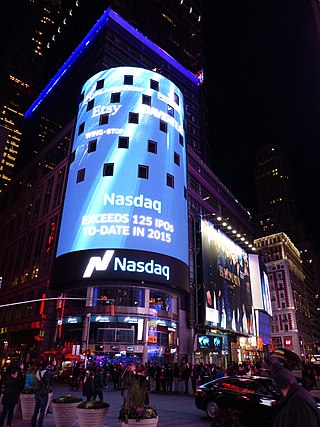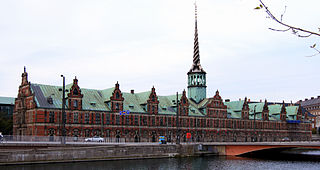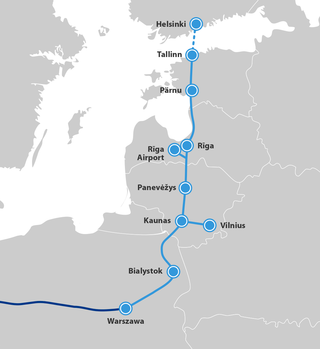The Nasdaq Stock Market is an American stock exchange based in New York City. It is the most active stock trading venue in the US by volume, and ranked second on the list of stock exchanges by market capitalization of shares traded, behind the New York Stock Exchange. The exchange platform is owned by Nasdaq, Inc., which also owns the Nasdaq Nordic stock market network and several U.S.-based stock and options exchanges. According to a Gallup poll conducted in 2022, approximately 58% of American adults reported having money invested in the stock market, either through individual stocks, mutual funds, or retirement accounts.

The Nasdaq Helsinki, formerly known as the Helsinki Stock Exchange, is a stock exchange located in Helsinki, Finland. Since 3 September 2003, it has been part of Nasdaq Nordic. After the OMX merger, it was referred to as OMX Helsinki (OMXH), then after NASDAQ's acquisition of OMX in February 2008, NASDAQ OMX Helsinki, and currently Nasdaq Helsinki.

The Singing Revolution was a series of events in 1987–1991 that led to the restoration of independence of the three then Soviet-occupied Baltic countries of Estonia, Latvia, and Lithuania at the end of the Cold War. The term was coined by an Estonian activist and artist, Heinz Valk, in an article published a week after the 10–11 June 1988 spontaneous mass evening singing demonstrations at the Tallinn Song Festival Grounds.

Nasdaq Nordic is the common name for the subsidiaries of Nasdaq, Inc. that provide financial services and operate marketplaces for securities in the Nordic and Baltic regions of Europe.
The Nasdaq Iceland, formerly known as the Iceland Stock Exchange (XICE) (Icelandic: Kauphöll Íslands), is a stock exchange located in Iceland. It was established in 1985 as a joint venture of several banks and brokerage firms on the initiative of the central bank. Trading began in 1986 in Icelandic government bonds, and trading in equities began in 1991. Equities trading increased rapidly thereafter. A wide variety of firms are currently listed on the exchange, including firms in retail, fishing, transportation, banks, insurance and numerous other areas. Because of the small size of the Icelandic economy and the low cost of public listing, many of the companies traded on the XICE are relatively small and are relatively illiquid.

The Nasdaq Vilnius is a stock exchange established in 1993 operating in Vilnius, Lithuania. It is owned by Nasdaq Nordic, which also operates Helsinki Stock Exchange and Stockholm Stock Exchange. OMX Vilnius (OMXVGI) is a stock market index for the Nasdaq Vilnius Exchange.
The Nasdaq Tallinn AS, formerly known as the Tallinn Stock Exchange, is a stock exchange operating in Tallinn, Estonia. Nasdaq Tallinn is the only regulated secondary securities market in Estonia. The major stock market index is Nasdaq Tallinn, formerly known as TALSE.

The Model European Parliament (MEP) is an international simulation of the working of the European Parliament for students aged 16–19. The aim of the programme is to give young people an insight into the workings of the European Parliament and raise their awareness of European citizenship. Two sessions are held each year, each involving 180 secondary school students.

Nasdaq, Inc. is an American multinational financial services corporation that owns and operates three stock exchanges in the United States: the namesake Nasdaq stock exchange, the Philadelphia Stock Exchange, and the Boston Stock Exchange, and seven European stock exchanges: Nasdaq Copenhagen, Nasdaq Helsinki, Nasdaq Iceland, Nasdaq Riga, Nasdaq Stockholm, Nasdaq Tallinn, and Nasdaq Vilnius. It is headquartered in New York City, and its president and chief executive officer is Adena Friedman.

The Nasdaq Copenhagen, formerly known as the Copenhagen Stock Exchange, is an international marketplace for Danish securities, including shares, bonds, treasury bills and notes, and financial futures and options.

The Baltic Assembly (BA) is a regional organisation that promotes intergovernmental cooperation between Estonia, Latvia, and Lithuania. It attempts to find a common position in relation to many international issues, including economic, political and cultural issues. The decisions of the assembly are advisory.
Nasdaq First North Growth Market is a division of Nasdaq Nordic and an alternative stock exchange for smaller companies in Europe. The market place Nya Marknaden in Stockholm changed name to First North in June 2006 and the First North exchange expanded to the stock exchange on Iceland in January 2007 and Helsinki in April 2007.

Rail Baltica is a greenfield rail transport infrastructure project underway, with a goal to integrate the Baltic states in the European rail network. Its purpose is to provide passenger and freight service between participating countries and improve rail connections between Central and Northern Europe, specifically the area southeast of the Baltic Sea. Furthermore, it is intended to be a catalyst for building the economic corridor in Northeastern Europe. The project envisages a continuous rail link from Tallinn (Estonia) to Warsaw (Poland), consisting of links via Riga (Latvia), Kaunas, and Vilnius (Lithuania). Its total length in the Baltic States is 870 kilometres (540 mi), with 213 kilometres (132 mi) in Estonia, 265 kilometres (165 mi) in Latvia, and 392 kilometres (244 mi) in Lithuania. Rail Baltica is one of the priority projects of the European Union (EU). It is part of the North Sea–Baltic Corridor of the Trans-European Transport Networks (TEN-T).

The Baltic states' housing bubble was an economic bubble involving major cities in Estonia, Latvia and Lithuania. The three Baltic countries had enjoyed a relatively strong economic growth between 2000 and 2006, and the real estate sectors had performed well since 2000. In fact, in between 2005Q1 and 2007Q1, the official house price index for Estonia, Latvia and Lithuania recorded a sharp jump of 104.6%, 134.3% and 106.7%. By comparison, the official house price index for Euro Area increased by 11.8% for a similar time period.

LHV Pank is an Estonian banking and financial services company headquartered in Tallinn. It is a subsidiary of AS LHV Group, a public company listed on the Nasdaq Tallinn Stock Exchange. The bank's clients include private individuals, small and medium-sized companies and institutional investors. LHV Pank is the third largest bank in Estonia. LHV has branch offices in Tallinn, Tartu and Pärnu. LHV Pank employs over 800 people. More than 350 000 clients use the bank's services. LHV Pank is one of the largest brokers on NASDAQ OMX Baltic stock exchanges and the largest broker for Baltic retail investors in international markets.














